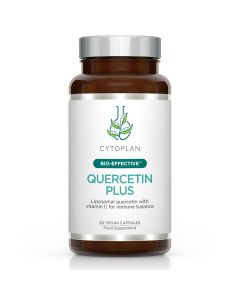What is quercetin?
Quercetin is a powerful plant nutrient found in a range of fruits, vegetables and wholegrains. It is from the flavonoid family of phytonutrients; colourful plant pigments that help to protect the plant – and then convey the same benefits to humans when we eat them. Flavonoids are well researched for their health-giving properties, and quercetin is one of the most abundant flavonoids in the human diet.
Some of the best food sources of quercetin include:
- Red onions - or yellow onions are still a good source
- Capers – extremely high in quercetin, though only used in small quantities
- Apples – especially if eaten with the skin
- Leafy vegetables – watercress, kale, rocket, spinach and other green leafy veg
- Asparagus
- Broccoli
- Berries – particularly bilberries, lingonberries, cranberries and blueberries
- Black, green and rooibos tea
- Tomatoes
- Red wine
...although this list isn't exhaustive! Including a rainbow of foods with red, green, and purple pigments will give you a great source of quercetin.
Quercetin health benefits
Antioxidant Action
Many of the health benefits of quercetin can be attributed to its antioxidant action. Free radicals are a group of highly reactive molecules that can cause damage to cells and tissues and negatively impact how they work (known as oxidative stress). Quercetin can enhance the body’s antioxidant defence systems, therefore inhibiting oxidative stress and damage.
Anti-inflammatory Effects
Quercetin’s anti-inflammatory properties involve inhibiting the production of inflammatory cytokines and enzymes, making it a potential therapeutic agent for various inflammatory conditions.
Allergy and Immune Support
Quercetin is thought to have antiallergic properties as it can influence several of the mechanisms involved in allergies. First, it can stabilise mast cells, reducing the release of histamine (the chemical that causes classic allergic symptoms such as sneezing, itching and wheezing).
As well as acting as a natural antihistamine, quercetin can inhibit the release of inflammatory cytokines that are involved in allergic responses, and may help to support a balanced immune response, as opposed to the over-stimulation such as seen in allergies.
Quercetin has also exhibited antiviral and antimicrobial properties in scientific studies.
Other health benefits of quercetin
Mental health and wellbeing
Emerging research demonstrates that quercetin may help to alleviate anxiety and depression-like behaviours through a number of different mechanisms.
Cardiovascular health
Quercetin has been shown to lower blood pressure, reduce cholesterol levels, balance blood glucose levels and improve endothelial function, making it a promising candidate for supporting cardiovascular health.
Cognitive health
Neuroinflammation heavily influences the development and progression of numerous brain disorders, including neurodegenerative diseases such as Alzheimer’s and Parkinson’s disease. Quercetin has exhibited anti-inflammatory and neuroprotective properties and, as such, has been suggested as a safe and effective therapy in neurodegenerative conditions.











